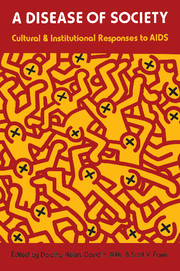Introduction: A Disease of Society: Cultural and Institutional Responses to AIDS
Published online by Cambridge University Press: 20 May 2010
Summary
Aids is no “ordinary” epidemic. more than a devastating disease, it is freighted with social and cultural meaning. More than a passing tragedy, it will have long-term, broad-ranging effects on personal relationships, social institutions, and cultural configurations. AIDS is clearly affecting mortality and morbidity — though in some communities more than others. It is also costly in terms of the resources — both people and money — required for research and medical care. But the effects of the epidemic extend far beyond medical and economic costs to shape the very ways we organize our individual and collective lives.
Social historians in recent years have pursued their studies of epidemics beyond the charting of pathogenesis and mortality to explore how diseases both reflect and affect specific aspects of culture. In writing about nineteenth-century cholera, for example, historian Asa Briggs (1961) called it “a disease of society in the most profound sense. Whenever cholera threatened European countries it quickened social apprehensions. Wherever it appeared, it tested the efficiency and resilience of local administrative structures. It exposed relentlessly political, social, and moral shortcomings. It prompted rumors, suspicions, and, at times, violent social conflicts.” Similarly, historian Gordon Craig (1988) observed: “It was no accident that preoccupation with the disease [cholera] affected literature and supplied both the pulpit and the language of politics with new analogies and symbols.”
The literature describing the impact of AIDS is burgeoning.
- Type
- Chapter
- Information
- A Disease of SocietyCultural and Institutional Responses to AIDS, pp. 1 - 14Publisher: Cambridge University PressPrint publication year: 1991
- 1
- Cited by



